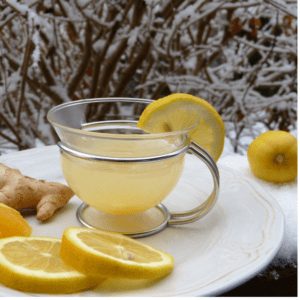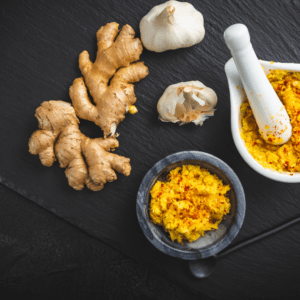Ginger is one of the most widely used seasonings, especially in curries and tea. The root itself has some very strong anti-nausea and anti-inflammatory properties. It may help soothe osteoarthritis pain, manage blood sugar levels, and improve brain health. So, let’s check into some of the remarkable health benefits that ginger offers and how it can be absorbed into our daily lives, complete with a ginger recipe to attempt at home.
Ginger Benefits: A Natural Remedy for Digestive Health
Ginger is packed with chemicals that stimulate digestion and relieve pain in the stomach. Research findings give credence to the allelopathic effects in the following areas of nausea:
Morning sickness during pregnancy: A safe remedy is to use ginger moderately where nausea is concerned.
Nausea post-surgery: This may help to deal with nausea and vomiting post-surgery.
Ginger also increases the speed of emptying the stomach to help with nausea resulting from indigestion and feelings of fullness. Studies have shown that ginger at a dose of 1.2 grams before meals helps improve symptoms of dyspepsia.
Ginger for Inflammation Control
Ginger may be highly valid for anti-inflammatory supplementation in conditions such as rheumatoid arthritis or osteoarthritis. Studies show that knee pain is reduced in patients with osteoarthritis taking ginger extract as a dietary supplement, thus reducing the need for medication for pain relief. Excess use of ginger may, however, result in a mild gastrointestinal upset; thus moderation is advocated.
Ginger for the Control of Blood Sugar
Incorporating ginger into the diet may prove helpful in the regulation of insulin and may ultimately lower one’s chances of having type 2 diabetes. Studies indicate that:
1. Patients with type 2 diabetes who consumed 1.6 grams of ginger powder for 12 weeks showed heightened insulin sensitivity and reduction in cholesterol levels.
2. Further, the consumption of powdered ginger at a dose of 2 grams per day led to a significant decrease in fasting blood sugar levels.
Sources:(https://www.healthline.com/nutrition/benefits-ginger-tea)
(https://www.webmd.com/diet/ss/slideshow-health-benefits-ginger)
Effective in Relieving Menstrual Cramps
In this regard, ginger may serve as a strong natural alternative for the alleviation of menstrual pain. In the study, the remedy demonstrated that ginger was as effective as non-steroidal anti-inflammatory drugs in reducing menstrual discomfort, thus providing a green option for pain relief.
Ginger for Brain Health Enhancement
Emerging research verifies that ginger acts as a general cognitive enhancer and may help in the protection from cognitive decline. In fact, the antioxidants and bioactive compounds present in ginger act against inflammation and oxidative stress, two major contributors to age-related brain diseases such as Alzheimer’s disease. Research indicates that ginger may improve memory, reaction time, and attention in middle-aged women.
The protective effect of ginger on the brain includes inhibition of inflammatory responses, which may accompany certain neurodegenerative conditions. Including ginger in your diet may be an easy and tasty way to promote good brain health in the long term.
Ginger for Immunity and Fighting the Common Cold
Fresh ginger juice or tea provides a soothing remedy for cold symptoms. It causes warmth and perspiration, helping the body to fight infections. Gingerol, one of the key bioactive compounds, helps in coughing, fever, and discomfort associated with colds.
A Look at the Other Health Benefits of Ginger
There is no doubt ginger is much more than a spice; for centuries, it has been a staple of holistic health improvement in traditional medical practice. Its versatility allows it to benefit multiple aspects of health at once. For one, consuming ginger on a regular basis may promote cardiovascular health. Ginger may improve circulation and lower cholesterol levels, thereby reducing the risk of heart-related issues. Its anti-inflammatory properties may help with chronic conditions like metabolic syndrome, which is a precursor to diabetes and heart disease. The active components in ginger, like gingerol, have also been reported to have some antimicrobial properties, acting as a natural shield against infections.
In Ayurveda and Traditional Chinese Medicine (TM) practice, ginger has been used in modern medicine to affect the body’s energies, stimulate digestion, and support detoxification. In more recent history, evidence emerged for the ability of ginger to enhance liver function, improve fat metabolism, and aid in toxin elimination. For those wishing to promote a healthy weight, ginger is a natural appetite suppressant, quelling hunger pangs and helping curb overeating. In addition, since ginger appears to possess thermogenic properties, it may slightly increase the body’s calorie burn-a subtle but effective component of any weight management plan.
Ginger also probably benefits mental well-being. Its calming properties counter the stress-induced production of cortisol and promote tranquility. The warming effects of ginger tea or fresh ginger in foods not only comfort the body but brighten the mind, particularly during the colder months or stressful days. Hence, this yin-yang attribute of physical and mental health well-being accounts for why ginger remains a global superstar through cultures and generations.
Ways to Cook with Ginger
Ginger-Lemon Honey Tea Recipe

This tea is a quick and easy way to heal and stay warm with ginger’s steam-inhalation benefits.
Ingredients:
1 cup of water
1-inch piece of fresh ginger, thinly sliced
1 tablespoon honey
1 tablespoon fresh lemon juice
Instructions:
Put water in a small saucepan and bring it to a boil.
Add ginger slices and let it simmer for about 5-10 minutes, depending on how strong you want it. Strain the tea into a mug.
Add honey and lemon juice to taste.
Serve warm and enjoy!
Why It Works:
The tea combines the anti-inflammatory and calming properties of ginger with the immunity-boosting properties of honey and lemon, making it perfect for cold relief or a soothing way to wind down your day.
Adrak Wali Chai (Indian Ginger Tea)
- Ingredients: One cup of water
- 1 Teaspoon fresh grated ginger
- 2 teaspoons loose black tea leaves
- 1 cup milk (optional)
- Sugar or honey to taste.
Instructions:
Add freshly grated ginger to hot water to infuse flavor for around 2 to 3 minutes.
Next, add the tea leaves, boil for another 2 minutes.
Add milk and bring to a boil.
Strain into glasses and sweeten as desired with honey or sugar before serving hot.
Ginger-Garlic Paste
A vital condiment throughout Indian cuisine, the Ginger-Garlic Paste is a quick way of adding the wonderful healing properties of ginger to various dishes.
Ingredients
1 cup peeled and chopped ginger
1 cup peeled garlic cloves
2 tablespoons oil
1 teaspoon salt
Preparation steps:
Blend ginger and garlic in a food processor or blender until smooth. Add oil to it; after that, you might store it for 1 week in an airtight container in the fridge.
Summary
Ginger, aside from assisting the digestive system function, has many benefits, including lowering inflammation, controlling blood sugar, increasing cognitive health, and enhancing immunity levels. Ginger can be taken regularly with meals or any beverage, such as ginger-lemon honey tea. Note that it should be consumed in moderation for a healthier you, alongside healthy eating habits because of its superfood status.
Note/Disclaimer- This article or any content on this website/blog is not medical advice. It is advised to please consult your doctor/dietician to check side effects as per your health conditions. Always make sure to consult your doctor if you’ve had/have any medical history.

